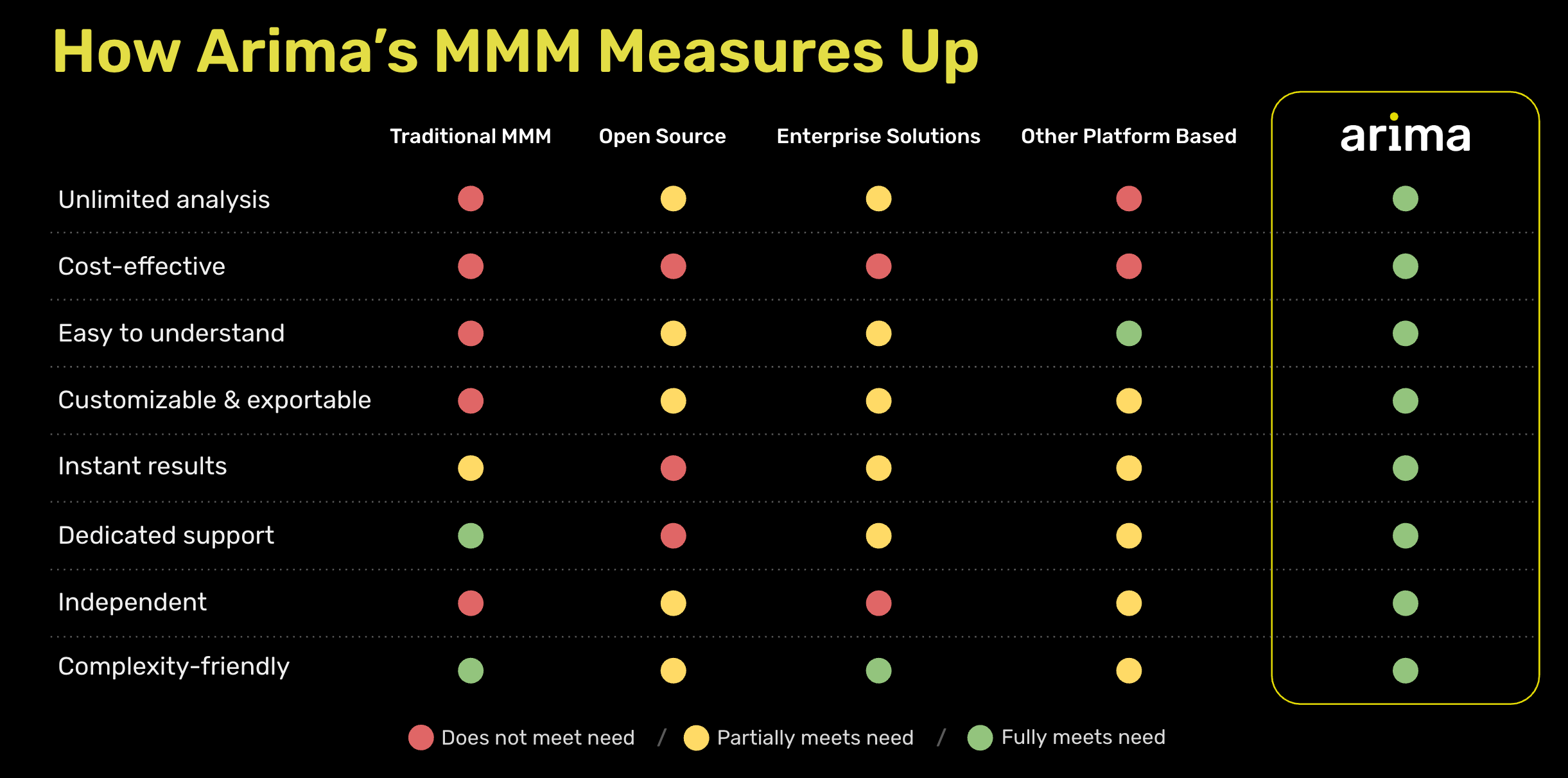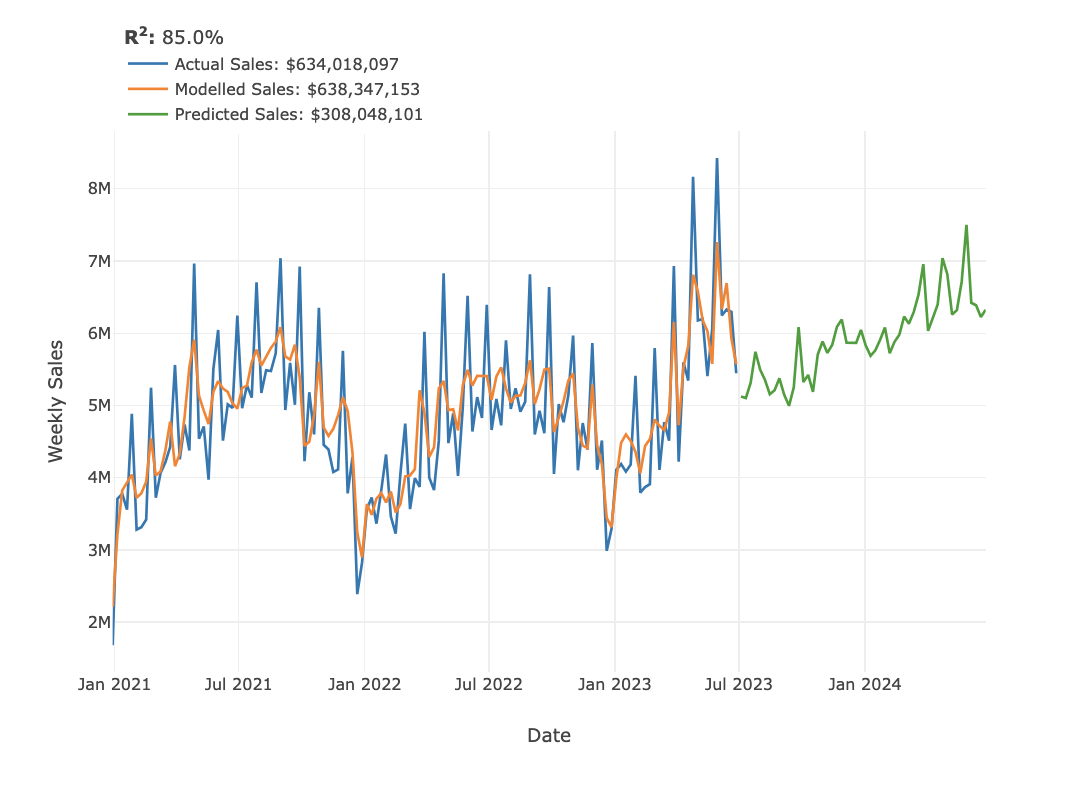Updated Nov 11, 2025
Marketing Mix Modeling tools (or MMM tools) are essential for key advertising team members:
- CMOs use them for strategic decision-making and proving ROI.
- Marketing directors rely on them to optimize budgets.
- Media analysts leverage MMM insights to build more effective campaigns.
These tools help teams measure marketing's impact on sales and guide data-driven decisions. But with so many traditional and next—gen options, choosing the right one can be challenging.
Factors in Choosing One MMM Tool Over Another
The best MMM tool depends on:
✔ Cost vs. benefit - The investment should lead to optimized media spend and incremental sales. Lower-cost solutions often provide a better return.
✔ User expertise - Some tools are user-friendly, while others require advanced analytics and programming skills.
✔ Integration - Some MMM solutions are part of a broader media planning toolset, while standalone options operate separately from media planners.
✔ Capabilities - Does the tool support geocentric A/B testing and incrementality analysis?
Types of MMM Tools
MMM tools vary in complexity, cost, and usability. Here's a breakdown of the main types:
- Traditional MMM - Like chartering a boat with a crew. These solutions are powerful but expensive, requiring specialized expertise. They offer dedicated support, making them ideal for large enterprises.
- Open-source MMM - Like downloading a boat-building kit. These tools are cost-effective and highly customizable but require programming skills and ongoing maintenance. They are less accessible to non-technical users.
- Enterprise MMM solutions - Like having a yacht built for you. These tools offer robust features and integrations but come at a premium price, making them best for organizations with larger budgets.
- SaaS-based MMM tools - Like renting a boat. They provide ease of use and fast results but often come with restrictions. Costs can escalate based on the number of models, updates, data volume, and support options.
- Arima's MMM solution - Like renting with unlimited mileage. It offers unlimited analysis at a cost-effective price, delivering instant results without the traditional complexity and delays of MMM.

- Arima
- Google Meridian (Open-Source)
- Meta Robyn (Open-Source)
- Funnel (Other Saas)
- Aryma Labs (Other Saas)
- Pecan AI (Other Saas)
- Sellforte (Other Saas)
- Keen Decision Systems (Other Saas)
- Mutinex (Other Saas)
- Recast (Other Saas)
- Rockerbox (Other Saas)
#1: Arima
Overview: Arima is an award-winning Marketing Mix Modeling (MMM) platform and Digiday's Best Marketing Analytics Platform of the Year. Designed for speed, accuracy, and accessibility, Arima helps brands and agencies measure marketing's true impact, forecast sales, and optimize spend , all without the complexity of legacy MMM systems.
Arima delivers fast, unlimited analyses through a clean, user-friendly interface. Arima's MMM platform works seamlessly with its Cross-Media Planner, forming a unified decision system that helps teams plan quickly and confidently.
Pros:
- Ease of use: Anyone in your organization can create and interpret MMMs.
- Fast & Scalable: Build and refresh models in hours.
- Fully Integrated: Combines planning, forecasting, and measurement in one platform.
- Flat-Rate Pricing: Unlimited models, zero hidden fees.
- Proven ROI: Focused on maximizing return on ad spend (ROAS).
Pricing and business model: Flat-rate pricing, unlimited models, and a white-label option for agencies.
Arima is best for brands and agencies seeking a flexible, all-in-one MMM platform that turns marketing data into confident decisions, fast.
#2: Google Meridian
Overview: Google's Meridian MMM is an open-source tool that helps marketers measure the impact of their advertising while keeping data private.
Pros:
- Open-sourced: This allows teams to modify the model to meet their specific needs.
- Integration with Google Cloud: Google Meridian is built to integrate seamlessly with Google Cloud, offering robust data-processing capabilities.
Pricing and business model: While the tool is free, users may still incur costs for the resources required to operate it - such as cloud computing, data storage, and the expertise needed to set up and maintain the models effectively.
Considerations:
- Technical Expertise Required: Google Meridian requires technical knowledge of programming and statistical modeling. This makes it less suitable for small teams without data-science expertise.
- Limited Support: Google does not offer technical support for Google Meridian.
Best For: Google Meridian is best suited for mid-to-large companies with in-house data science or analytics teams, especially those already using Google Cloud.
#3 Meta Robyn
Overview: Meta Robyn is another open-source MMM solution developed by Meta to help advertisers optimize media spending and measure the impact of various channels.
Pros:
- Scalability and Flexibility: The tool allows for customization in model parameters, enabling users to create tailored MMM models that align with unique business needs.
- Integration with Meta Ecosystem: Meta Robyn is optimized for businesses running campaigns on Meta platforms, providing deep insights and more precise modeling for Facebook and Instagram ads.
Pricing and business model: It is free to use, and anyone can access it to create and customize their MMMs without any restrictions on the number of models they build. Similar to Google Meridian, the tool itself is free; however, users may incur costs for the resources needed to run it and for the expertise required to set up and maintain the models effectively.
Considerations:
- Technical Expertise Required: Meta Robyn requires a certain level of technical knowledge to operate effectively.
- Limited Support: Meta does not offer technical support for Meta Robyn.
Best for: Meta Robyn is ideal for medium to large businesses with dedicated data science resources. It is particularly well-suited for organizations looking to optimize advertising performance on Meta platforms at scale.
#4: Funnel
Overview: Funnel is a marketing data aggregation tool that automates collecting, processing, and reporting data from various marketing platforms.
Pros:
- Automation: Strong automation capabilities for data collection, which saves time and ensures real-time updates across all marketing channels.
- Customizability: Flexible setup allows users to create tailored reports and dashboards to fit specific business needs.
- Support: Offers responsive customer support and robust onboarding resources to help users get up to speed quickly.
Pricing and business model: Funnel offers flexible plans tailored to business needs, with pricing based on data sources, volume, and support.
Best For: Funnel is best suited for mid-sized to large businesses looking to centralize and automate their marketing data collection and reporting across multiple platforms.
#5: Aryma Labs
Overview: Aryma Labs offers a modern, data-driven MMM platform with advanced analytics and predictive modeling capabilities. Aryma Labs aims to optimize media spend and improve campaign performance through machine learning and customizable MMM solutions.
Pros:
- Advanced Analytics: Leverages machine learning to deliver detailed insights and predictive capabilities, enhancing model accuracy.
- Customizability: Allows users to tailor models to their unique data and business goals, making it adaptable to various industries.
- User-Friendly Interface: Designed for ease of use, enabling marketing teams to gain actionable insights without deep technical expertise.
Pricing and business model:Aryma Labs' most popular MMM plan starts at $20,000 and includes services like end-to-end model building, ROI and campaign effectiveness measurement, media saturation analysis, and budget allocation simulations.
Best For: Aryma Labs is primarily suited for larger companies with established data teams that can handle a more technical setup. While it offers some flexibility, the platform's complexity and higher cost make it less practical for smaller or fast-moving marketing teams.
#6: Pecan AI
Overview: Pecan AI provides a predictive analytics platform that leverages machine learning to support data-driven decision-making.
Pros:
- Predictive Power: Pecan's platform forecasts outcomes, which allows marketing teams to foresee trends and adjust their strategies accordingly.
- No-Code/Low-Code Interface: Built for ease of use, Pecan's platform allows marketing teams to access powerful predictive insights without requiring deep technical skills.
- Quick Insights: With automated data integration and model building, Pecan is an effective option for fast-paced teams.
Price and business model: Pecan AI's Starter plan costs $950/month, providing AI-driven predictions and model training with in-app support.
Best For: Pecan AI is mainly suited for larger companies that already have clean, well-structured data. Smaller teams may find its predictive features limited without additional setup or technical support.
#7: Sellforte
Overview: Sellforte focuses on helping brands maximize their ROI. Sellfort's platform uses advanced analytics to analyze the impact of various marketing channels, which allows businesses to make strategic, evidence-based decisions on media spend and campaign effectiveness.
Pros:
- Channel-Level Insights: Sellforte offers granular visibility into the performance of individual channels, allowing marketing teams to understand what's working and where to reallocate spend.
- Automated Reporting: The platform automates data collection and reporting, streamlining the process of turning raw data into actionable insights and saving time for marketing teams.
Pricing and business model:
Sellforte offers two plans:
- Performance Plan ($3,390/month) - For eCommerce/D2C teams with digital media connectors, a campaign dashboard, and daily model updates.
- Brand Plan ($4,390/month) - Includes everything in the Performance plan, plus offline media support with monthly updates.
Best For: Sellforte is ideal for mid-to-large companies that are highly focused on ROI and need detailed insights into their channel performance. It's particularly well-suited for companies looking to fine-tune their media spending based on data-backed recommendations.
#8: Keen
Overview: Keen is a modern MMM platform focused on connecting marketing data to revenue outcomes through predictive insights.
Pros:
- User-Friendly: Designed for ease of use, accessible for marketing teams with limited technical resources.
- Performance optimization: Receive AI-powered recommendations to improve results.
- Automate data collection: With over 300 integrations, Keen allows users to see the full picture, easily.
Pricing and business model:
- Disruptor: $50,000/year per brand - Unlimited users, self-service with API access.
- Influencer: $75,000/year per brand - Unlimited users, fully managed service.
Best For: Keen is best for mid-sized businesses willing to trade depth for simplicity. While straightforward, it may lack the flexibility and scalability needed by more advanced or multi-brand teams.
#9: Mutinex
Overview: Mutinex is a marketing mix modeling platform that provides real-time analytics and decision support, helping marketing teams optimize campaign effectiveness with data-driven insights.
Pros:
- Real-Time Insights: Delivers live analytics, enabling marketers to adjust campaigns on the fly.
- Actionable Recommendations: Simplifies complex data into clear, easy-to-follow suggestions, making it accessible to non-data scientists.
- Scalability: Built to process large datasets, making it ideal for businesses with extensive marketing operations.
Pricing and business model: Mutinex's pricing and plans are not publicly available.
Best For: Mutinex is mainly suited for large organizations with dedicated analytics teams. Smaller or fast-moving marketing teams may find the platform's complexity and data requirements challenging to manage.
#10: Recast
Overview: Recast helps marketers optimize their advertising by combining MMM and Multi-Touch Attribution. It uses AI to predict revenue based on ad spend and provides tools for budgeting, forecasting, and tracking performance.
Pros:
- A comprehensive view: Combines MMM and MTA for a full picture of marketing performance.
- Flexible: Adaptable to different business needs, like boosting revenue or improving channel mix.
- Privacy-Friendly: Uses first-party data to ensure secure and accurate attribution.
Pricing and business model: Recast's pricing and plans are not publicly available.
Best For: Recast is most appropriate for data-heavy teams that can handle the model's technical depth. Its setup and maintenance demands may be excessive for typical marketing departments.
#11: Rockerbox
Overview: Rockerbox is a marketing performance measurement platform that integrates multiple methodologies, including Marketing Mix Modeling and Multi-Touch Attribution, to provide marketers with comprehensive insights.
Pros:
- Comprehensive Attribution: Combines MMM and MTA for a 360-degree view of marketing performance.
- Customizable & Flexible: Adaptable to specific business goals, whether maximizing revenue or optimizing channel mix.
- Privacy-First Approach: Leverages first-party data for accurate attribution while maintaining privacy.
Pricing & Business Model: Rockerbox offers various plans, but pricing details are not publicly available.
Considerations:
Complexity for Small Teams: The depth of data and customization options may be overwhelming for smaller teams without dedicated analytics resources
Best for: Rockerbox's Market Mix Model platform is best for medium to large businesses that need robust, data-driven insights for budgeting and performance forecasting.
Best practices for maximizing the effectiveness of your MMM tool
To maximize the effectiveness of any MMM tool, it's essential to define clear goals and KPIs for your campaigns. Ensure you're using high-quality, accurate data from all media channels, and keep it updated to capture shifts in trends and consumer behavior. Regardless of your MMM, be prepared to adjust your strategy based on insights - reallocate your budget to top-performing channels or explore new target audiences. Consistently review and update the model, using real-time data when possible, to keep your results in line with your objectives.

Key Takeaways
Choosing the Right MMM Tool Depends on Team Needs
- The best MMM tool for your business depends on factors like team size, technical expertise, and the number of clients you manage. Some tools emphasize ease of use, while others cater to data-savvy teams with advanced analytics. Additionally, the right fit can vary depending on whether your focus is local, national, or international markets.
Next-Gen MMM Tools Offer a Range of Features
- The 2025 landscape includes open-source tools (like Google Meridian and Meta Robyn) and SaaS solutions (like Arima). Each tool has unique strengths, from machine learning-powered insights to automation and cross-integration.
Open-Source vs. SaaS: Trade-Offs to Consider
- Open-source MMM tools like Google Meridian and Meta Robyn are free but require technical expertise, while SaaS solutions provide user-friendly interfaces and support at a cost. Businesses must weigh cost, customization, and ease of implementation.





